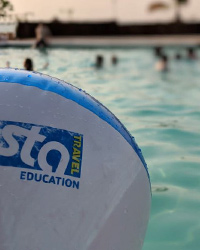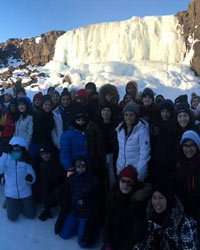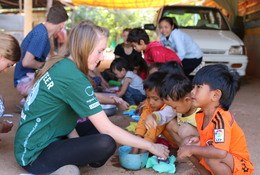Why Climate-conscious school trips matter: A guide for educators
 Projects Abroad
Projects AbroadAcross education, sustainability is no longer a side topic - it’s a core priority. Schools are increasingly incorporating environmental awareness into their curriculum, enrichment programmes, and broader ethos. This shift reflects a growing recognition that young people need not only to understand the science of climate change but also to experience practical solutions in action.
However, environmental awareness isn’t restricted to the classroom - educators also have a unique opportunity to model sustainable choices through school trips.
Through considerate planning, you can model sustainable choices for students, from the programme destination to the organisation you partner with. This demonstrates to students the importance of making responsible choices and doing their due diligence.
Alongside this, seeing faculty members lead the charge on responsible travel builds credibility with parents, governors, and the broader community while preparing students to become informed global citizens.
Climate-positive school travel
Being climate-positive means going beyond “carbon neutral”. It’s not just about balancing emissions - it’s about removing more carbon from the atmosphere than we produce.
At Projects Abroad, we calculate the full footprint of each school programme, including in-destination transport, food, and accommodation. We then offset 110% of those emissions through our partnership with Ecologi, supporting reforestation, renewable energy, and community-led sustainability initiatives around the world.
Should schools plan overseas trips in the era of climate change?
Schools can and should plan overseas trips in the era of climate change, provided they are done responsibly.
With Projects Abroad, every programme is designed to be climate-conscious, ensuring your programme doesn’t come at the expense of our planet. Through carbon offsetting, long-term, locally led partnerships, and a dedication to long-term sustainability goals, our programmes enable schools to travel overseas responsibly.
These programmes also connect students to climate action in a meaningful, practical way. By experiencing conservation and sustainability efforts first-hand, they become empowered, environmentally responsible global citizens, capable of inspiring change and shaping attitudes and behaviours of future generations.
The impact of a school trip overseas extends far beyond the journey itself, inspiring positive change in the way students think, act, and lead for generations to come.
Checking for sustainability credentials
> B Corp school travel
We are proud to be a Certified B Corp, a recognition of the high standards we uphold in reducing our environmental footprint and embedding sustainability across every aspect of our work.
For schools, this means every trip planned with us sets a clear example: international travel can be both educational and environmentally responsible. By choosing climate-positive programmes, you show your students that global learning doesn’t come at the planet’s expense - it contributes to a more sustainable future.
> Long-term, locally led programmes
Sustainability isn’t just about reducing your carbon footprint - it’s about building long-term infrastructure that is maintained and nurtured.
Through locally led partnerships, we collaborate with community experts, educators, and stakeholders to deliver long-lasting experiences.
We don’t just arrive in destinations; we immerse ourselves in them. Students often walk to their project sites, live within local communities, and engage with cultural practices daily. Most programmes also include a single planned excursion, rather than being constantly “on the road”, which helps keep the footprint of each trip lower beyond flights alone.
This approach ensures our programmes integrate naturally into local communities and economic ecosystems while reinforcing sustainability through day-to-day choices. Whether students are engaged in conservation, education, or social development, they are contributing to initiatives grounded in the local context and sustained by local knowledge.
The result is more than a school trip - it’s a chance for students to experience meaningful change, develop a sense of global belonging, and return with a tangible purpose that extends beyond the classroom.
> Alignment with the UN Sustainable Development Goals
Adopted by the UN in 2015, the 17 SDGs are targets to help build a greener, fairer and better world by 2030. Projects Abroad has also adopted the SDGs, with each programme working towards different goals.
Our Climate Action Plan is strategically aligned with the UN Sustainable Development Goals (SDGs), ensuring that our organisational practices and field programmes adhere to rigorous environmental and ethical standards.
By participating in UN SDG-aligned school trips, you can ensure that your group's experience is not only educational - it's part of a global effort to build a fairer, more sustainable future. Your school will become part of that broader mission, modelling values that extend far beyond the classroom.
Start thinking about how your next school trip can be a climate-positive experience. Contact us to learn how your school can make a meaningful impact while inspiring students.

Planning a Climate-Conscious School Trip: Practical Steps for Educators
Planning a climate-conscious school trip is straightforward when you have an experienced partner to guide you. With over 30 years of expertise, Projects Abroad supports schools at every stage to ensure programmes are safe, sustainable, and educationally valuable.
Here are some ways in which you can ensure your school trip is planned sustainably and responsibly.
> Do your due diligence
Research your programme provider and find out their approach to credible and responsible travel. Explore our sustainability credentials.
> Choose your destination and programme
Our Partnerships team will work with you to select the most suitable destination and programme for your group’s needs and objectives. All of our trips are automatically carbon offset. To maximise your environmental impact, explore our Conservation programmes. (See our Top 5 Conservation Trips for inspiration.)
> Integrate meaningful learning outcomes
Plan activities that extend beyond the classroom, providing students with opportunities to apply their knowledge in real-world contexts. By engaging directly with climate action, they develop critical thinking, problem-solving, and collaboration skills, while also gaining a deeper awareness of their role in creating sustainable solutions.
> Prepare students for responsible travel
Before departure, we provide training to raise awareness of cultural and environmental issues. This ensures students travel responsibly, engage respectfully with local communities, and build skills for lifelong global citizenship.
> Offset your flight emissions
While our partnership with Ecologi covers 110% of your programme's carbon footprint, we encourage groups to also look into offsetting their flight emissions. This process is simplified by our partnership with CLevel, which allows you to input your flight information into our helpful calculator and learn how to offset the impact of your flight.

Educational benefits for students
> Experiential learning
Climate-conscious school trips provide students with practical skills, new perspectives, and unique memories. Putting theory into practice, our programmes work alongside your usual lessons, connecting students’ knowledge with hands-on experiences to deepen their understanding and awareness of global issues.
Your group can apply biology, geography, and environmental science lessons to real-world conservation issues while working alongside conservationists with tasks such as reforestation, wildlife and habitat protection and preservation, data collection, and awareness outreach.
> Environmental responsibility
When students are given the agency to make a positive impact, they develop a sense of environmental responsibility. Understanding that they can influence change fosters confidence, critical thinking, and leadership skills that will support them throughout their academic journey and beyond.
> Global citizenship
These experiences also highlight the impact of climate change on local communities, the economy, and agriculture. By broadening students' understanding of both social and environmental challenges, they will develop the ability to respect diverse perspectives and approaches to global issues. This nurtures empathy, teamwork, and communication - all key competencies for success in higher education and future careers.
Ultimately, climate-conscious school trips inspire students to become lifelong advocates for sustainability. They return home not only with a deeper understanding of the subject but also with the conviction that their actions matter. This combination of academic enrichment and personal growth is what transforms a trip into a truly educational journey with lasting impact.
> Boosted CVs and University applications
These programmes are a great addition to any CV or university application. Through our partnership with the Centre for Global Citizenship Studies, students can earn UK-accredited diplomas worth 16 UCAS points. This not only supports students' applications for university, but it also helps to improve your school's metrics and rankings.
Our accredited diplomas in Marine or Wildlife Conservation are ideal for students looking to pursue careers in Environmental Science, Marine Biology, Education and Community Development, and Global Studies and Sustainability.
Speak to our Partnerships team to learn more about our fully accredited International Volunteering Diplomas.
Ready to take the next step?
Connect with our Partnerships team to start planning a climate-conscious school trip that inspires your students and protects the planet.
If you are interested in hearing a bit more about how Projects Abroad can help you with planning your next school visit then why not get in touch here.
Childcare & Community in Cambodia
Join our meaningful Childcare and Community Programme in Cambodia with your students. Immerse yourselves in a rich ancient culture and experience daily life in a vibrant, fast-growing country.
view details..
Giraffe and Lion Conservation in Kenya
Based in the Soysambu conservation area in Kenya, our focus is to preserve the abundance of large mammals and improve the environment by clearing feral plants and creating waterholes. Join us on this programme that blends the physical and the scienti
view details..
Wildlife Conservation in Botswana
You and your students will work at the Wild At Tuli Reservation, on the banks of the Limpopo River, ensuring the survival of wildlife and preserving the local area. Work with conservationists to protect animals from human activity.
view details..
Building in Nepal
This hands-on, physical programme provides much-needed earthquake-proof classrooms for Nepali schools and a bright environment for learning. Your students will work hard together to achieve meaningful, lasting, and highly satisfying results.
view details..
Conservation in the Galapagos Islands - Ecuador
Help expert conservationists collect valuable scientific data and look after the Galapagos Islands' biodiverse and unique ecosystems. Join us to learn more about the Galapagos wildlife, flora and fauna, as Charles Darwin did almost 200 years ago!
view details..
School trips: The benefits of volunteering abroad
 Learn about the benefits of travelling to a new country with your school group, including improved confidence, cultural exchange, and a sens
Learn about the benefits of travelling to a new country with your school group, including improved confidence, cultural exchange, and a sens
Experiential learning: The secret to engaging your students!
 Experiential learning is a great tool to engage your students in their own learning journey.
Experiential learning is a great tool to engage your students in their own learning journey.
Top 5 Conservation School Trips
 Take your students for a walk on the wild side with a conservation school trip overseas!
Take your students for a walk on the wild side with a conservation school trip overseas!
The 3 P's of school trips
 Molly at STA Travel guides us through the stages teachers need to go through when booking an overseas trip.
Molly at STA Travel guides us through the stages teachers need to go through when booking an overseas trip.
The lure of Iceland for school groups
 Find out what makes Iceland so popular and tips on how to get the most out of your Iceland school trip.
Find out what makes Iceland so popular and tips on how to get the most out of your Iceland school trip.










 Subscribe
Subscribe